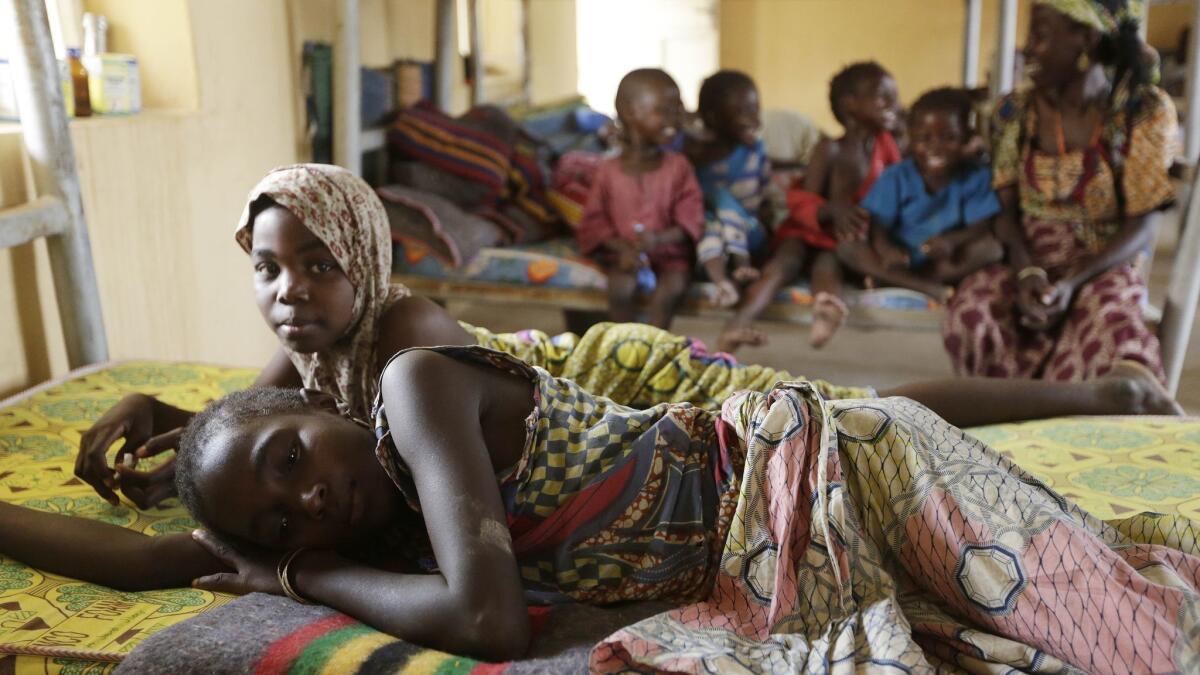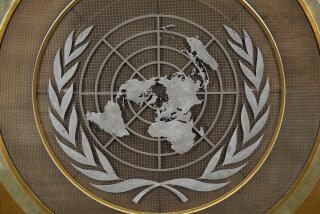Supposedly defeated, Boko Haram blamed for killing 30 in suicide attack
Reporting from Johannesburg, South Africa — Boko Haram has been torn in half and has steadily lost territory to the Nigerian forces that have pounded away at the extremist group, with government leaders at times claiming that the insurgency had finally been put down.
But a pair of suicide bombings Friday in a busy marketplace in Madagali, Nigeria, quickly underscored the difficulty in quashing the extremist militia, which authorities quickly blamed for the blasts.
At least 30 people were killed, the worst attack in months. Authorities said the bombers appeared to be teenage schoolgirls who likely picked the busiest market day of the week to attack.
Though weakened, Boko Haram remains capable of devastating attacks on soft civilian targets such as markets, bus stations and camps for people displaced by the grinding conflict.
Like many of Boko Haram’s previous bombings, the attacks Friday in Adamawa state were carried out by female suicide bombers, concealing explosive vests under the long flowing garments worn by most women in the the country’s northern territory, where the majority of the population is Muslim.
And the attack seemed calculated to kill as many civilians as possible, targeting a crowded section of the market on the busiest day of the week around lunchtime.
No group claimed responsibility for the attack, but Boko Haram usually doesn’t issue statements on its attacks.
Nigeria’s National Emergency Management Agency confirmed the blasts and said scores were killed. A military spokesman told local media that 30 were killed and 67 were injured by the attackers.
Madagali is in the north of Adamawa state, close to Boko Haram’s remaining stronghold in the Sambisa Forest. The town suffered a similar attack at a nearby bus station last December, an incident that also killed 30 people.
The conflict in northeastern Nigeria has driven an estimated 2.6 million people from their homes and has led to widespread starvation, with farmers unable to plant crops, fishers unable to fish in Lake Chad and traders unable to transport goods. Last week, the United Nations doubled its humanitarian appeal for the region to $1 billion for emergency food to target 6.9 million people in desperate need of help.
Around 75,000 children could starve to death unless donors respond swiftly to the crisis, the U.N. has warned.
Only two years ago Boko Haram commanded a vast swathe of territory in the country’s northeast. It set up an Islamic state and swore allegiance to the leader of the Islamic State, Abu Bakr Baghdadi.
Since then the Nigerian extremist militia has lost almost all its territory and has splintered into two factions, one led by Abubakar Shekau and the other, which is more closely identified with Islamic State, led by Abu Musab Barnawi.
The Barnawi group was critical of the Shekau group for attacks it believed had killed too many civilians, a security analyst reported, after the split was revealed in August.
Nigeria’s military has been bombing the Sambisa Forest for months, but army chief of staff Lt.-Gen. Tukur Buratai last month said ground forces had begun advancing into the area to drive out the extremists.
According to a military account, an operation code named Final Rescue has been launched to rescue a group of schoolgirls kidnapped from Chibok village in 2014. There were 276 girls kidnapped. While some escaped, and 21 girls were freed in October, 196 are still missing, some believed to have been killed in Nigerian air strikes on the Sambisa Forest.

Advancing forces have attacked a series of Boko Haram camps in the forest, seizing ammunition, rifles, anti-aircraft guns, drugs and military vehicles, including tanks. Security forces encountered Boko Haram ambushes and booby traps during the operation.
Nigerian President Muhammadu Buhari said last week that hundreds of Boko Haram fighters had been surrendering to Chadian forces, part of a multinational force fighting the extremists. He said that multinational forces were preparing a coordinated operation to finally eliminate the group.
Nigerian’s military has repeatedly claimed to have killed Shekau, mostly recently in August. But in September Shekau released a video saying he was still alive.
“To the despot Nigerian government: Die with envy. I’m not dead,” Shekau said in the video.
The insurgency has been festering for more than a decade, with the number killed uncalculated.
ALSO
In the battle for control of key oil installations in Libya, a military man takes center stage
Italy says thousands of Nigerian women who arrive as migrants are forced to work as prostitutes
Gambia’s president said he’d rule for a billion years. But voters decided otherwise
More to Read
Sign up for Essential California
The most important California stories and recommendations in your inbox every morning.
You may occasionally receive promotional content from the Los Angeles Times.










